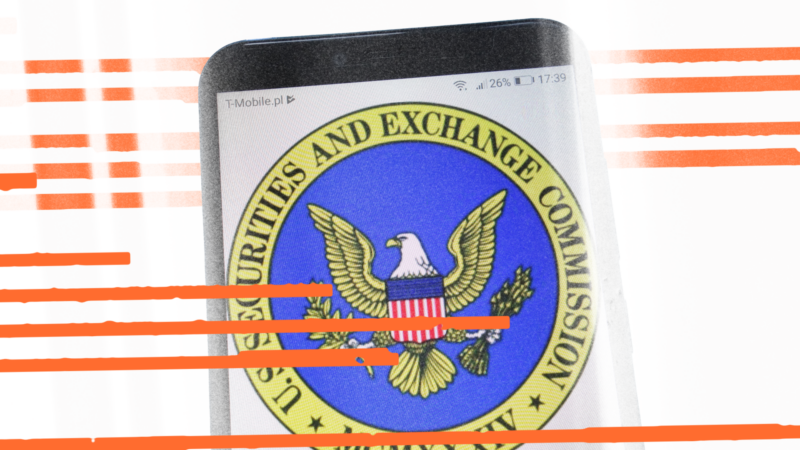Abolish the Securities and Exchange Commission
Despite its enormous budget and vast regulatory powers, the agency has failed to detect major frauds while wasting time and money on relatively useless disclosures.

This article is part of an occasional online series that expands on our Abolish Everything issue by suggesting ways we could do without even more federal agencies or departments.
The Securities and Exchange Commission (SEC) was created as an independent agency in 1934. It's been called the mother-of-all-securities regulator. This agency is remarkably good at killing trees to produce hundreds of millions of paper reports for shareholders and at employing bureaucrats who interfere in U.S. financial markets.
It is not, however, very good at preventing the corporate fraud that it was created to stop.
Despite its enormous annual budget of $2.5 billion, 4,800 employees, and vast regulatory powers, the SEC has failed to detect major frauds like Bernie Madoff's Ponzi scheme and Enron's accounting deceptions. It's not for lack of being warned. For instance, Madoff whistleblower Harry Markopolos testified that the SEC ignored his exhortations for years, focusing instead on smaller fry. In fact, the SEC has been accused of disproportionately targeting smaller retail investors while being lenient with large institutions.
Apart from meddling with the stock, bond, and related Wall Street markets, the SEC's most basic task is to mandate and oversee the "disclosures and financial statements of more than 5,000 exchange-listed public companies with an aggregate market capitalization today of $51 trillion," according to Jennifer Schulp, the director of financial regulation studies at the Cato Institute. This task, unsurprisingly, as David Stockman rightly describes, generates "an endless tsunami of filings that are basically superficial, proforma, mechanical, ritualistic, minimally informative and lawyered ten-ways-to-Sunday." Meanwhile, investors and traders still have to invest lots of money to dig out the information they need about the prospects and performance of registered companies before they invest or trade tens of trillions of dollars each year.
Not satisfied with wasting everyone's time and money on relatively useless disclosures, the SEC has been trying to expand its power further without explicit congressional approval. For example, Gary Gensler, appointed as SEC chairman by President Joe Biden, proposed a rule requiring public companies to disclose climate-related information in their registration statements and annual reports to the SEC. After an unprecedented pushback, the SEC nevertheless went ahead with a scaled-back, but still burdensome, separate disclosure regime for climate-related information. Now investors and scholars alike are hoping that the rule will be blocked by a U.S. appellate court.
Besides, the costs of SEC compliance are staggering. Looking at the climate disclosure rule alone, Stone Washington of the Competitive Enterprise Institute writes, "Under the SEC's own calculations, the average firm will pay an extra $864,000 for the mandated disclosures, though some analysts believe the actual cost will be higher. Firms will also be forced to hire lawyers, accountants, and ESG experts to contend with the rule's estimated 39 million additional hours of paperwork."
As always, the burden falls particularly hard on smaller firms and startups. But it also raises the barrier to going public, reducing investment opportunities for ordinary Americans and keeping innovative companies private longer. And the agency stifles financial innovation through heavy-handed regulation of new financial products and technologies, as seen in its approach to cryptocurrency and blockchain innovations.
Biden's SEC took an aggressive stand toward regulating cryptos all the while Sam Bankman-Fried's massive FTX cryptocurrency exchange fraud was happening under Gensler's nose. His bureaucrats were too busy cracking down on small cryptocurrency projects while Bankman-Fried was partying with the politically powerful elites and his crypto exchange scamming investors.
Meanwhile, the SEC's accounting standards are as ineffective as its disclosures. Stockman, for instance, explains that the SEC spends "hundreds of millions per year enforcing [Generally Accepted Accounting Principles (GAAP)] standards when the daily financial vocabulary of Wall Street traders and analysts amounts to a systematic GAAP work-around."
Finally, for all the noise the SEC makes about transparency and disclosure, it controls information and speech with its insider-trading restrictions and its outdated quiet-period rules, which demand that every investor have access to the same information simultaneously. By preventing the rapid dissemination of important information through trading activity, the SEC's insider-trading restraints reduce market efficiency and prevent more accurate pricing of stocks and other traded assets.
This agency has perennially been asleep at the wheel on enforcement, burdensome to retail investors, and out of touch with what's going on in markets. It scares off capital with burdensome rules, companies aren't going public anymore, and its current chair has used his position for obvious ideological goals rather than furthering the agency's mission. It's a sad sight from a sad agency. It needs to go.
The good news is that a post-SEC world wouldn't mean a financial Wild West. Markets have natural mechanisms for self-regulation that government oversight often undermines rather than enhances. Private enforcement through civil courts, class action lawsuits, and contract law could handle fraud cases more efficiently than bureaucratic oversight. Better yet, actors in the financial markets with trillions at stake have all the incentives necessary to be on the watch-out for abuses and frauds. The result would be a more dynamic, innovative, and safer financial market driven by reputation and results—rather than by regulatory compliance and ideological fads.


Show Comments (12)